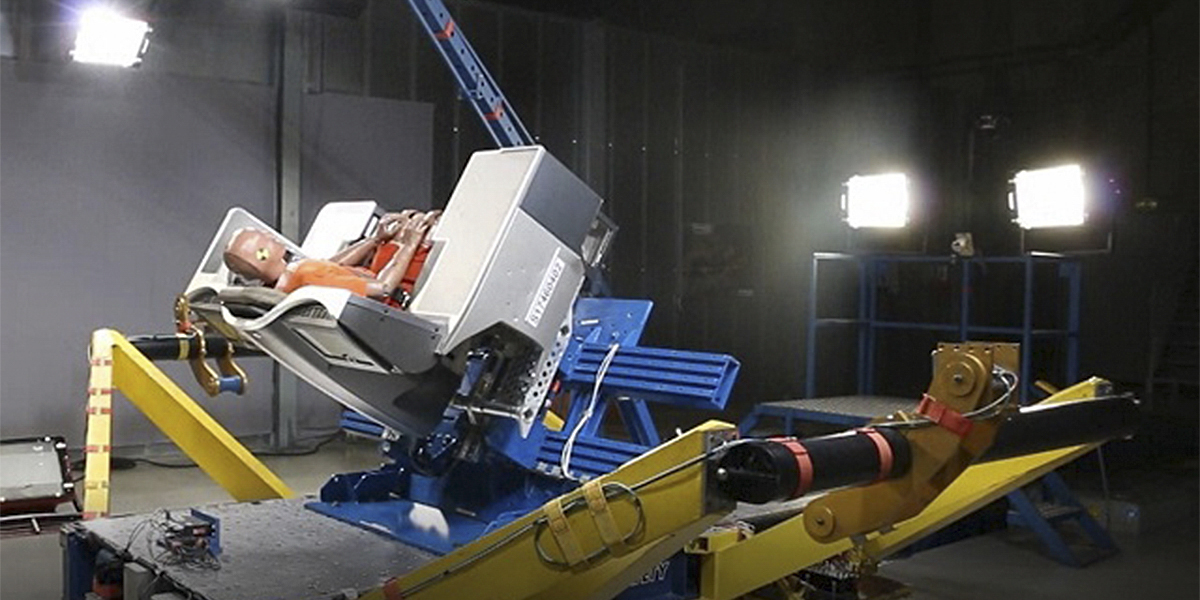ASTM D256 Izod Impact Testing of Plastic Airbag Parts
The ASTM D256 standard is a globally recognized method used to measure the impact resistance of rigid plastics. In automotive testing, this test is particularly important for evaluating the performance of plastic components in airbags, which are critical passive safety systems designed to protect occupants during vehicle collisions.
Plastic parts within airbags must withstand significant mechanical stress without compromising their integrity or functionality. The ASTM D256 Izod impact test provides a standardized approach to assess how these materials behave under sudden high-impact conditions. This is crucial because even minor flaws in the plastic structure could lead to failures that may endanger passengers.
The test involves impacting a notched sample at a specified velocity using a pendulum. The energy absorbed by the sample during this impact indicates its resistance to fracture. For airbag components, it ensures that the material can absorb the forces generated during deployment without breaking apart or losing structural integrity. This is essential for preventing potential hazards such as shrapnel injuries.
Our laboratory specializes in conducting ASTM D256 tests on various types of plastic used in automotive airbags. We employ advanced equipment and follow strict protocols to ensure accurate and reliable results. Our services cater not only to manufacturers but also to quality managers, compliance officers, R&D engineers, and procurement professionals who need assurance that their materials meet the highest safety standards.
By leveraging our expertise in this specific test, we help clients enhance product reliability, reduce risks associated with material failure, and comply with international regulations. This service is integral for maintaining the integrity of airbag components, thereby contributing to safer vehicles on the road.
Scope and Methodology
| Parameter | Description |
|---|---|
| Pendulum Impact Energy | The energy delivered by the pendulum is critical to simulating real-world impact scenarios. It must be accurately set according to ASTM D256 standards. |
| Sample Preparation | Samples are cut from larger parts following precise dimensions and tolerances as specified in the standard. |
| Pendulum Velocity | The speed at which the pendulum strikes the sample affects the test results. It is set to ensure reproducibility and comparability of data across different specimens. |
| Testing Environment | The temperature and humidity levels are controlled to prevent any environmental factors from influencing the outcome. |
In this detailed methodology, we focus on achieving consistency and precision in every step. The choice of test parameters is critical for obtaining meaningful results that reflect real-world conditions accurately. Our laboratory adheres strictly to ASTM D256 guidelines throughout the entire process, ensuring reliable data that can be used effectively by our clients.
Competitive Advantage and Market Impact
The ability to conduct ASTM D256 Izod impact tests on plastic airbag parts provides a significant competitive advantage in several ways. First, it ensures compliance with international safety standards such as ISO 14150-3:2007 and EN 14398:2004, which are crucial for market entry into regions like Europe and North America.
Secondly, our expertise in this specialized testing allows us to offer insights beyond mere compliance. By providing detailed reports on material performance under impact conditions, we help manufacturers optimize their designs and improve product reliability. This can lead to cost savings by reducing the need for redesigns or recalls due to safety issues.
In terms of market impact, our service contributes to enhancing overall automotive safety. Reliable airbag components are vital for protecting passengers during accidents. By ensuring that these parts meet stringent testing criteria, we support the development of safer vehicles, which is a priority across the industry.
Use Cases and Application Examples
| Application | Description |
|---|---|
| Airbag Housing | We test the housing to ensure it can withstand the forces generated during airbag deployment without failing. |
| Deployer Plastics | The deployer is a critical component that must be robust enough to function correctly under high stress. We assess its durability through ASTM D256 tests. |
| Tether Anchors | Tether anchors are tested for their ability to hold securely during deployment, ensuring they do not detach or fail. |
| Energy Management Systems | We evaluate the performance of energy management systems that incorporate plastic components under impact conditions. |
Our expertise in ASTM D256 Izod impact testing extends beyond individual components to integrated systems. For instance, we have conducted tests on multi-part assemblies where different types of plastics interact during deployment. This comprehensive approach ensures that the entire airbag system functions safely and reliably.





